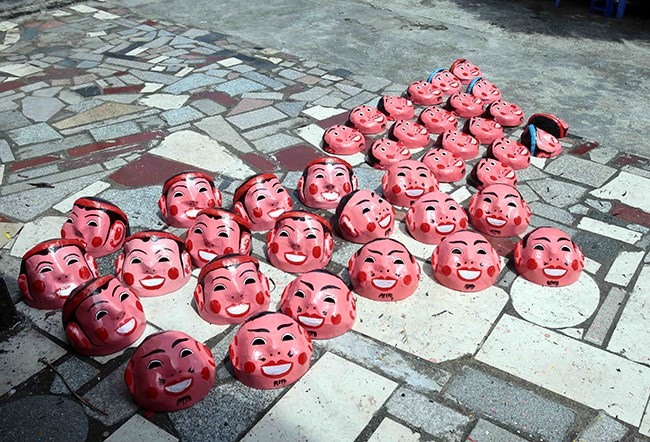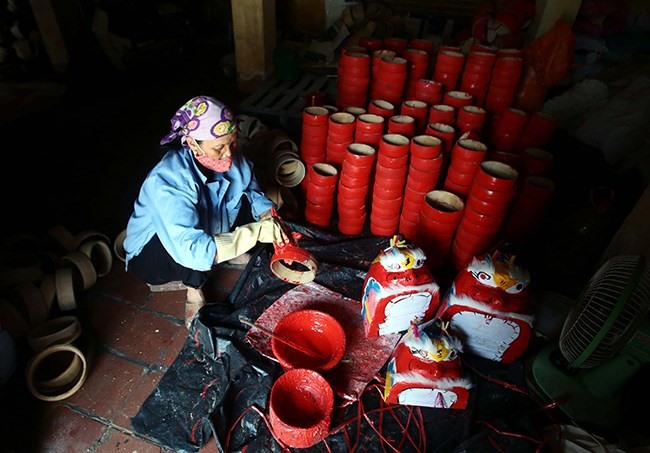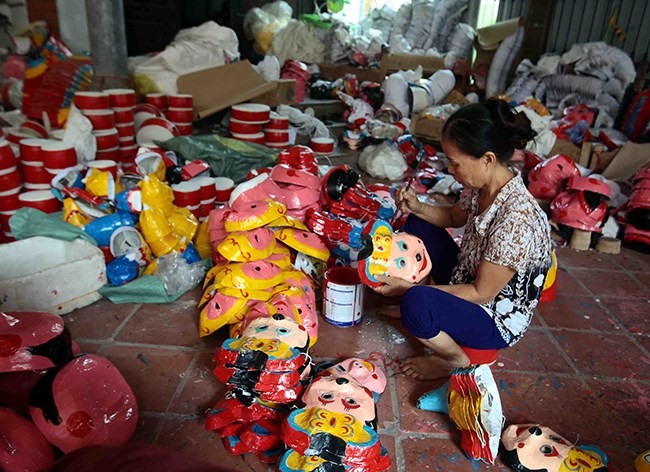 Life & Style
Life & Style

As the mid-autumn festival approaches, a festive atmosphere prevails throughout Hảo Village in the northern province of Hưng Yên.
 |
| Carefully arranged: The finished masks are left for drying after being decorated by the artisans. |
By Phương Hà
As the mid-autumn festival approaches, a festive atmosphere prevails throughout Hảo Village in the northern province of Hưng Yên.
Wandering through the village, located roughly 60km from Hà Nội, visitors can catch sight of villagers making traditional toys like drums, colourful paper masks and star-shaped lamps—beloved features of every Vietnamese childhood. For generations, the villagers have specialized in these crafts, playing a critical role in mid-autumn celebrations across the country.
It is unknown when the village first began to specialize in producing traditional toys. The peak of craft production came at the end of the 1980s, when nearly all villagers took up the trade and the village was thronged with merchants who came from all over Việt Nam to purchase toys just before the festival.
As the country has developed and become more globally integrated, however, more and more imported toys—both eye-catching and cheaper than handcrafts—have appeared, particularly from China. The traditional toys of Hảo Village, and the livelihoods that rely on them, are under threat.
As a consequence, many households have quit the traditional work to seek better jobs and more stable income. Only several families still pursued their ancestor’s trade.
The products of the village, however, still hold their own attractiveness, thanks to their simplicity and close association with people’s childhood memories. As there have been much doubt casted on the quality of imported toys in recent years, Hảo Village’s traditional toys have regained some popularity, and locals have been happy to satisfy demand by returning to their traditional trade.
“Our traditional toys have been gained popularity among consumers, particularly the children, in the last two years,” local artisan Vũ Thị Là said. “We have to work very hard to meet the high demand both from the north to the south.”
 |
| Nation’s drumbeat: The toy drums are painted with red paint and left for drying. — Photos tienphong.vn |
A meticulous process
At present, there are about 20 households producing traditional toys. Besides toy drums, which have been the main product of the village, the villagers have produced star lamps and paper masks, all made with simple and natural materials like bamboo or paper.
Vũ Huy Tự, another artisan in the village, said the most important materials to make a toy drum are lime wood and buffalo skin. The wood is cut into pieces and lathed to create the body of the drum while the buffalo skin is scraped thin before being dried.
The process of making a drum is sophisticated, demanding meticulousness from each worker.
The final step, which is also the hardest one, is stretching the buffalo skin over the drum surface.
“If the skin is stretched too tight, the drum cannot produce the proper sound. If it is loose, the drum will be broken down easily,” Là said, adding that this is why the worker must constantly test the elasticity of the drum surface.
Another favourite product of Hảo Village is the masks made from paper board or pasteboard, depicting children’s favourite characters from Vietnamese folktales. Based on cement moulds, the artisans give the discarded papers a second life with their skilful hands by turning them into soulful and eye-catching toys.
During the peak production period, each household could make over 6,000 products. Prices of each range from VNĐ10-50,000 (US$0,4-2,2) depending on size. On normal days, the income of each household is just enough to make ends meet, so every villager longs for the festivals where their products take centre stage.
 |
| Celebration of culture: The masks are painting with vivid colours, depicting children’s favourite folktale characters. |
And if the visitors wish, the villagers will willingly instruct them on how to make a drum or a mask on their own.
Another surprise to every visitor is the lovely children of the village. Born and raised in the hundreds-year-old craft community, they seem to have inherited remarkable skill from their parents. Not only can they take over the housework, they can also help their parents with creating the traditional toys that will bring joy to other children.
As the trend of travelling to the craft villages to learn about the traditional cultural values is on the rise, Hảo Village has become a tourist destination, particularly for families with children. The wide open area around which the village’s houses cluster has become a playground for many children to immerse themselves in the atmosphere of their parents’ childhood.
After visiting Hảo Village, almost every person holds in their hands a colourful drum or a mask. It is certain that the fresh smell of paint still lingering on the toys will entice the visitor to return.
Even facing severe competition with foreign toys, the villagers strongly believe that their traditional products will always have a special place in Vietnamese children’s hearts. As villager Là said: “Traditional trade will never fall into oblivion.” — VNS